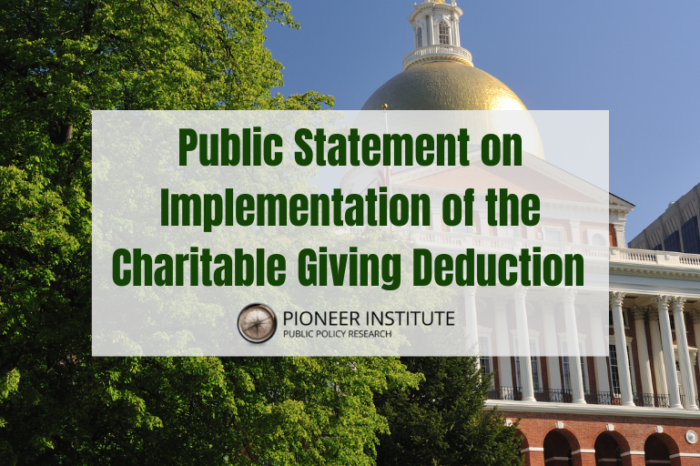Public Statement on Implementation of the Charitable Giving Deduction
Despite being awash in cash, the state Legislature just overrode Gov. Charlie Baker’s veto of a provision to delay by yet another year a tax deduction for charitable donations. Rep. Mark Cusack, House chair of the Joint Committee on Revenue, said “it doesn’t mean no, just not now.” If not now, when?
In 2000, Massachusetts voters approved by a 72-28 margin a charitable contribution tax deduction, which would allow taxpayers to recoup an additional five cents on the dollar in state taxes for a charitable gift, up to a maximum of $300. The deduction was suspended amid a budget crunch, and the legislature agreed that it would take effect when the state personal income tax was at 5 percent.
The income tax rate fell to 5 percent in January 2020. However, due to uncertainty about the impact of the COVID-19 pandemic on the state’s budget, Gov. Baker delayed the deduction’s implementation until 2022.
Last month, the governor vetoed a provision that would have delayed implementation of the charitable giving deduction yet again. According to Baker, “the combination of strong state revenues and serious needs facing non-profits and charitable organizations necessitates this tax deduction’s going into place.”
Why not incentivize those taxpayers who donate to contribute to their communities? The Massachusetts Nonprofit Network has estimated that a majority of charitable donations are from individuals with lower or middle-income backgrounds; so the charitable tax deduction would put money back into Massachusetts’ citizens pockets, no matter their socioeconomic status.
In 2019, it was estimated that the deduction could cost Massachusetts about $64 million in FY 2021, and about $300 million in full fiscal years after that. This sounds like a hefty number, but it must be put in a proper context. If collections continue on the projected path, Massachusetts will collect about $31 billion in tax revenue in FY 2021. This surpasses forecast collections, which could lead to a substantial surplus at the end of FY 2021.
The people have spoken — 21 years ago. It’s time to let the voices of the many be heard.



